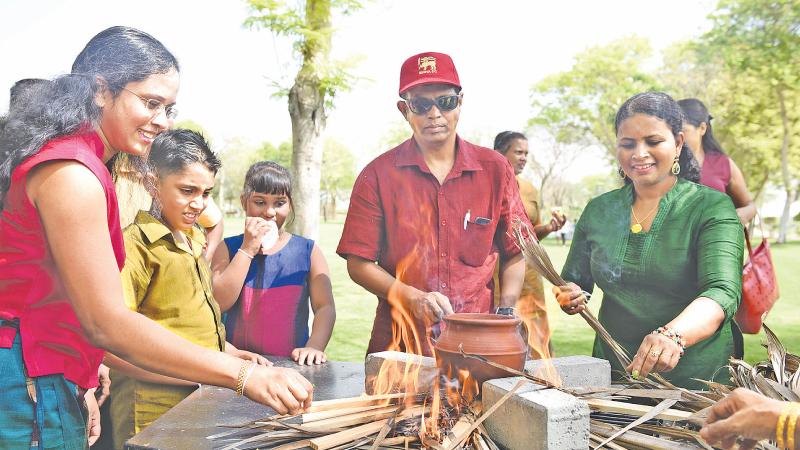
“The Sinhala and Tamil New Year festival is all about the gift of family: a gift that lasts forever. Family is the foundation of the great festival season, because they are the ones who support and love us unconditionally.”
As I read this meaningful extract in a recent newspaper, I remembered about a memorable evening experience of Dilshani - a young member of my previous office staff. She said:
“This happened the night before our traditional New Year. With my brother, I was visiting my parents in Bandarawela, our home town.We were seated in the living room, and the light rain and the crackle in the wood-burning stove broke the silence. After a while, father went over to a corner of the room, picked up his violin and began playing one of Sunil Shantha’s songs. Mother smiled, put down her sewing and joined him with her long flute.”
“My brother cheered, put down the novel, drifted to the piano and joined in. Finally, l - the only singer of the family, added my voice. The session went on for one and a half hours until dinner time. When we stopped, my father hugged us both and smiled”
I have often remembered how warm, happy and loved - I felt at that moment. It took me many years, though, to learn that the love surrounding our family didn’t just happen. We had to learn about love from one another and give it back often.
Dilshani is right. Love never just happens - not even to people who seem as naturally loving as her father, mother and brother. But, there is, as Dilshani narrated, a climate that is best for love - a way of living that hastens the maturity of this matchless gift.
Time
First, love needs time. Mature love is like a tree, moving slowly from the seed in the ground to the sheltering splendour of its prime. You need time to deepen affection, to appreciate one another’s differences, share each other’s joys and griefs.
Love also needs another kind of time: a few special hours set aside. In these days of mad rush, most of us are clock-watchers trying every minute to solve not only our everyday problems but the profound ones that need mellowing. Husbands and wives seldom share a peaceful hour of affection and understanding. Parents scarcely find time to talk to their children. And friends put each other on-hold with “We must lunch together soon.” But, it doesn’t happen!
Experience
I once knew of a father and son who had drawn so far apart through the years that they found they had little to say to each other. The son, just out of university, had planned to spend a few weeks travelling across the country in an old jeep.
One day, when he was nearly ready to leave, he saw his father walking on a busy street and was struck by a singular loneliness in that long-familiar face. He stopped his jeep, met his father and on a sudden impulse said, “Thathi, come with me on my trip. Let’s spend a holiday together.”
At great risk to the family business, the father went along with his son. Together they camped, hiked, sat by the rivers and lakes, explored village paths.
“1 learned more about being a father in those five weeks than in all my son’s 23 years,” the father told me. All of us should have room for such love - love for whom it is worth risking sizable pieces of time we think we can’t spare.
Honesty
Love also needs honesty - not the nit-picking honesty that keeps account of every flaw, but the deeper honesty of the heart that lets us share what is most genuine in ourselves, imperfections and all.
When we are not brave enough to do this, it is often because we feel unworthy of love. We’re afraid our true selves cannot stand the scrutiny of the lover’s eye, so we make up a self to fit the expectations of others.
But a profound love can never grow in such shifting sands. It comes instead to people who are capable of acknowledging their feelings and willing to risk being themselves.
The courage to accept ourselves prepares us for that other magnanimous grace so basic to love - the ability to accept others as they are. According to Dilshani, her mother and father were very unalike. Mother was fiery, intense but brilliant. Father was gentle, impractical but content with little.
The differences sometimes troubled them, but they bridged them with the things they shared - their music, garden, temple work, books, and family life.
When we accept the differences of our loved ones, we find that those very differences provide the mystery and wonder of human relationships. It’s foolish to expect perfection; it doesn’t exist. The key is to recognize and enjoy our differences.
Words
Finally, love needs words to make it real. Without words, quarrels can’t be resolved, resentments can’t come to the surface, we lose the power to share the meaning of our lives.
“But what shall I say?” a reserved friend asked. “Well,” I answered, “what do you say when you feel too cold? You say, “I feel very cold here,”
You don’t give it a lot of thought to say so. It’s the same with love. If you’re across a room from someone you love and if you think, “I’m so glad I have him,” then say it: “I’m so glad you are here.”
Sometimes, of course, the message is more complicated, more difficult to say, but we can begin by putting into words those straightforward thoughts that come to us clearly - thoughts like “I’m proud of you”, “I’m glad to see you.”
Love is not a single act, but a lifetime venture in which we are always learning, discovering, growing.
